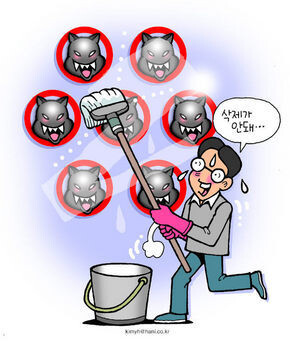hankyoreh
Links to other country sites 다른 나라 사이트 링크
Internet users: beware of malicious, self-downloading code

Malicious computer codes, with built-in protections making them nearly impossible to remove, are spreading fast over the Internet. "Rootkit" is among the worst of such codes, say experts in the field.
According to AhnLab, a vaccine developer, among spyware and adware reported by computer users last year, the number of programs using the Rootkit code string reached as many as 57. Rootkit is designed to enable hackers to obtain site manager-level rights in a given network, thus helping them dominate individual computer users’ systems.
Rootkit secretly downloads itself onto a victim’s computer during Internet use.
Industry experts said that the damages inflicted by Rootkit are worse than reported since the code string is not well known, and the hackerware program usually lies dormant for a long time.
An AhnLab official said, "Even if the root of the problem lies in Rootkit, users tend to think that any system malfunction has been prompted by their computer itself. No diagnosis [for Rootkit] is available, and inevitably users choose to reformat their whole system, which costs a lot."
Worse yet, Rootkit causes private information leaks, computer virus infections, and further downloads and upgrades of malicious codes. Experts warn that a system that has inadvertently downloaded Rootkit could be vulnerable to fatal virus infection. Computer security companies currently categorize Rootkit as a malicious code, but have not yet estimated the real damage so far caused by the program.
Ordinary computer users do not know how to detect the code. Another problem is that the program is not limited to working with other malicious codes but also with new Internet business models such as keyword searches. The only solution at this moment for ordinary users is to take action when their toolbars or vaccine programs are not functioning properly.
An official of the Korea Information Security Agency said that "there is a kind of trend of Rootkit working with other malicious codes around the world. The only solution is to contact experts as soon as possible if infection is suspected."
Please direct questions or comments to [englishhani@hani.co.kr]
Editorial・opinion
![[Column] Park Geun-hye déjà vu in Yoon Suk-yeol [Column] Park Geun-hye déjà vu in Yoon Suk-yeol](https://flexible.img.hani.co.kr/flexible/normal/500/300/imgdb/original/2024/0424/651713945113788.jpg) [Column] Park Geun-hye déjà vu in Yoon Suk-yeol
[Column] Park Geun-hye déjà vu in Yoon Suk-yeol![[Editorial] New weight of N. Korea’s nuclear threats makes dialogue all the more urgent [Editorial] New weight of N. Korea’s nuclear threats makes dialogue all the more urgent](https://flexible.img.hani.co.kr/flexible/normal/500/300/imgdb/original/2024/0424/7317139454662664.jpg) [Editorial] New weight of N. Korea’s nuclear threats makes dialogue all the more urgent
[Editorial] New weight of N. Korea’s nuclear threats makes dialogue all the more urgent- [Guest essay] The real reason Korea’s new right wants to dub Rhee a founding father
- [Column] ‘Choson’: Is it time we start referring to N. Korea in its own terms?
- [Editorial] Japan’s rewriting of history with Korea has gone too far
- [Column] The president’s questionable capacity for dialogue
- [Column] Are chaebol firms just pizza pies for families to divvy up as they please?
- [Column] Has Korea, too, crossed the Rubicon on China?
- [Correspondent’s column] In Japan’s alliance with US, echoes of its past alliances with UK
- [Editorial] Does Yoon think the Korean public is wrong?
Most viewed articles
- 1‘We must say no’: Seoul defense chief on Korean, USFK involvement in hypothetical Taiwan crisis
- 2Will NewJeans end up collateral damage in internal feud at K-pop juggernaut Hybe?
- 3[Column] Park Geun-hye déjà vu in Yoon Suk-yeol
- 4Why Korea shouldn’t welcome Japan’s newly beefed up defense cooperation with US
- 5Thursday to mark start of resignations by senior doctors amid standoff with government
- 6N. Korean hackers breached 10 defense contractors in South for months, police say
- 7[Guest essay] The real reason Korea’s new right wants to dub Rhee a founding father
- 8[Column] ‘Choson’: Is it time we start referring to N. Korea in its own terms?
- 9Kim Jong-un expressed ‘satisfaction’ with nuclear counterstrike drill directed at South
- 10[Editorial] New weight of N. Korea’s nuclear threats makes dialogue all the more urgent